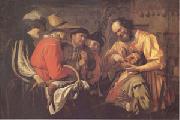Wholesale Oil Painting No Minimum |
|||||||||||
|
|
|||||||||||

|
|||||||||||
|
|
|
||||||||
Gerrit van Honthorst1590-1656 Dutch Gerrit Van Honthorst Galleries Gerard van Honthorst (November 4, 1592 - April 27, 1656), also known as Gerrit van Honthorst and Gherardo della Notte, was a Dutch painter of Utrecht. He was brought up at the school of Abraham Bloemaert, who exchanged the style of the Franckens for that of the pseudo-Italians at the beginning of the 16th century. Margareta Maria de Roodere and Her Parents by Gerrit van Honthorst (1652) Oil on canvas, 140 x 170 cm. Centraal Museum, UtrechtInfected thus early with a mania which came to be very general in the Netherlands, Honthorst went to Italy in 1616, where he copied the naturalism and eccentricities of Michelangelo da Caravaggio. Home again about 1620, after acquiring a considerable practice in Rome, he set up a school at Utrecht which flourished exceedingly. Together with his colleague Hendrick ter Brugghen, he represented the so-called Dutch Caravaggisti. In 1623 he was president of his gild at Utrecht, where he had married his cousin. He soon became so fashionable that Sir Dudley Carleton, then English envoy at The Hague, recommended his works to the earl of Arundel and Lord Dorchester. In 1626 he received a visit from Rubens, whom he painted as the honest man sought for and found by Diogenes. The queen of Bohemia, sister of Charles I of England and electress palatine, being in exile in the Netherlands, gave Honthorst her countenance and asked him to teach her children drawing; and Honthorst, thus approved and courted, became known to her brother Charles I, who invited him to England in 1628. There he painted several portraits, and a vast allegory, now at Hampton Court, of Charles and his queen as Diana and Apollo in the clouds receiving the duke of Buckingham as Mercury and guardian of the king of Bohemia's children. Charles I, whose taste was flattered alike by the energy of Rubens and the elegance of Van Dyck, was thus first captivated by the fanciful mediocrity of Honthorst, who though a poor executant had luckily for himself caught, as Lord Arundel said, much of the manner of Caravaggio's colouring, then so much esteemed at Rome. |
||||||||
|
|
||||||||
The Tooth Puller (mk05)
The Tooth Puller (mk05) Painting ID:: 20356 |
1628
Canvas,51 1/4 x 73 1/4''(130 x 186 cm).Acquired in 1930 1628 Canvas,51 1/4 x 73 1/4''(130 x 186 cm).Acquired in 1930 |
|||||||
|
|
||||||||
|
Giovanni Battista Tiepolo Italian Rococo Era Painter, 1696-1770 Giovanni Battista Tiepolo was born in Venice on March 5, 1696. His father, who was part owner of a ship, died when Tiepolo was scarcely a year old, but the family was left in comfortable circumstances. As a youth, he was apprenticed to Gregorio Lazzarini, a mediocre but fashionable painter known for his elaborately theatrical, rather grandiose compositions. Tiepolo soon evolved a more spirited style of his own. By the time he was 20, he had exhibited his work independently, and won plaudits, at an exhibition held at the church of S. Rocco. The next year he became a member of the Fraglia, or painters guild. In 1719 he married Cecilia Guardi, whose brother Francesco was to become famous as a painter of the Venetian scene. They had nine children, among them Giovanni Domenico and Lorenzo Baldassare, who were also painters. In the 1720s Tiepolo carried out many large-scale commissions on the northern Italian mainland. Of these the most important is the cycle of Old Testament scenes done for the patriarch of Aquileia, Daniele Dolfin, in the new Archbishop Palace at Udine. Here Tiepolo abandoned the dark hues that had characterized his early style and turned instead to the bright, sparkling colors that were to make him famous. The Tooth Puller (mk05) 1754 Canvas 32 x 43 1/4''(81 x 110 cm)Pendant to Carnival Scene or the Minuet Collection of Count Algarotti in Venice 1779;bequeathed in 1938 R.F |
||||||||
|
|
||||||||
|
Prev Next
|
||||||||
|
|
||||||||
|
Related Paintings to Giovanni Battista Tiepolo :. |
||||||||
|
|
||||||||
|
CONTACT US |

